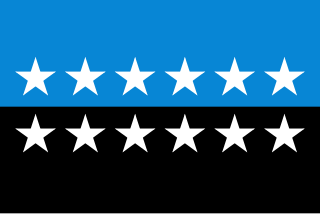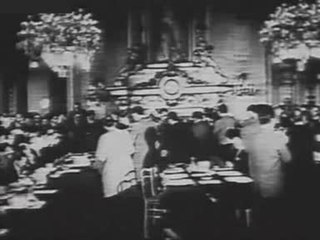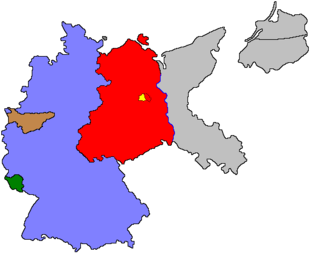
The European Coal and Steel Community (ECSC) was an organisation of six European countries created after World War II to regulate their industrial production under a centralised authority. It was formally established in 1951 by the Treaty of Paris, signed by Belgium, France, Italy, Luxembourg, the Netherlands, and West Germany. The ECSC was the first international organisation to be based on the principles of supranationalism, and started the process of formal integration which ultimately led to the European Union.

The European Economic Community (EEC) was a regional organisation that aimed to bring about economic integration among its member states. It was created by the Treaty of Rome of 1957. Upon the formation of the European Union (EU) in 1993, the EEC was incorporated and renamed the European Community (EC). In 2009, the EC's institutions were absorbed into the EU's wider framework and the community ceased to exist.

The Treaty of Rome, officially the Treaty establishing the European Economic Community brought about the creation of the European Economic Community (EEC), the best-known of the European Communities (EC). It was signed on 25 March 1957 by Belgium, France, Italy, Luxembourg, the Netherlands and West Germany and came into force on 1 January 1958. Under the name Treaty on the Functioning of the European Union, it remains one of the two most important treaties in the modern-day European Union (EU).
The Structural Funds and the Cohesion Fund are financial tools set up to implement the regional policy of the European Union. They aim to reduce regional disparities in income, wealth and opportunities. Europe's poorer regions receive most of the support, but all European regions are eligible for funding under the policy's various funds and programmes. The current Regional Policy framework is set for a period of seven years, from 2014 to 2020.

The Schuman Declaration is a statement made by French foreign minister Robert Schuman on 9 May 1950. It proposed to place French and West German production of coal and steel under one common High Authority. This organization would be open to participation of other Western European countries. This cooperation was to be designed in such a way as to create common interests between European countries which would lead to gradual political integration, a condition for the pacification of relations between them: "Europe will not be made all at once, or according to a single plan. It will be built through concrete achievements which first create a de facto solidarity. The coming together of the nations of Europe requires the elimination of the age-old opposition of France and [West] Germany".

The Directorate-General for International Cooperation and Development is one of the departments of the European Commission. It operates under the authority of the European Commissioner for International Partnerships, Jutta Urpilainen.

The Monnet Authority was the first High Authority of the European Coal and Steel Community (ECSC), between 1952 and 1955. Its president was Jean Monnet of France.

The Mayer Authority was the second High Authority of the European Coal and Steel Community (ECSC), between 1955 and 1958. Its president was René Mayer of France.

The Malvestiti Authority was the fourth High Authority of the European Coal and Steel Community (ECSC), between 1959 and 1963. Its president was Piero Malvestiti of Italy.

The Del Bo Authority was the last High Authority of the European Coal and Steel Community (ECSC), between 1963 and 1967. Its president was Rinaldo Del Bo of Italy. Del Bo was briefly followed by Albert Coppé's interim Authority.
The Archive of European Integration (AEI) is an electronic repository and archive for research materials on the topic of European integration and unification. The AEI contains two types of documents:

The period saw the first moves towards European unity as the first bodies began to be established in the aftermath of the Second World War. In 1951 the first community, the European Coal and Steel Community was established and moves on new communities quickly began. Early attempts at military and political unity failed, eventually leading to the Treaties of Rome in 1957.
European Union (EU) concepts, acronyms, and jargon are a terminology set that has developed as a form of shorthand, to quickly express a (formal) EU process, an (informal) institutional working practice, or an EU body, function or decision, and which is commonly understood among EU officials or external people who regularly deal with EU institutions.

The International Authority for the Ruhr (IAR) was an international body established in 1949 by the Western Allies to control the coal and steel industry of the Ruhr Area in West Germany. Its seat had been in Düsseldorf.

The High Authority was the executive branch of the former European Coal and Steel Community (ECSC). It was created in 1951 and disbanded in 1967 when it was merged into the European Commission.
The Ministry of Finance is the central specialized body of public administration, which develops and promotes the unique policy of training and managing public finances, applying financial levers in line with the requirements of the market economy. In its activity, the Ministry of Finance is governed by the Constitution of the Republic of Moldova, the laws of the Republic, the decrees of the President of the Republic of Moldova, the resolutions of the Parliament, the ordinances, the decisions and the provisions of the Cabinet of Moldova.
The United States Mission to the European Union (USEU) is the diplomatic mission of the United States to the European Union; it is based in Brussels, Belgium. The US has maintained diplomatic relations with the EU and its predecessors since 1953. The first predecessor of the current mission was the US diplomatic mission to the European Coal and Steel Community in Luxembourg, which opened in 1956. In 1961, the US Mission to the European Communities was established in Brussels, which later became the United States Mission to the European Union, upon the latter's establishment in 1993.

The Accession of the United Kingdom to the European Communities (EC) – the collective term for the European Coal and Steel Community (ECSC), the European Economic Community (EEC) and the European Atomic Energy Community (EAEC) – took effect on 1 January 1973. This followed ratification of the Accession treaty which was signed in Brussels on 22 January 1972 by the Conservative prime minister Edward Heath, who had pursued the UK's application to the EEC since the late 1950s. Denmark and Ireland also joined as part of the same expansion but Norway, who had signed the treaty, declined to ratify it and so it was amended to exclude that country. The ECSC and EEC would later be integrated into the European Union under the Maastricht and Lisbon treaties in the early 1990s and mid-2000s.

Léon Daum was a French mining engineer, company director and senior European administrator. He was a member of the High Authority of the European Coal and Steel Community from 1952 to 1959.

The European Schools is an intergovernmental organisation, which has established, finances, and administers a small group of multilingual international schools, bearing the title "European School", which exist primarily to offer an education to the children of European Union (EU) staff; offers accreditation to other schools, bearing the title "Accredited European School", under national jurisdiction within EU member states to provide its curriculum; and oversees the provision of the secondary school leaving diploma, the European Baccalaureate.









